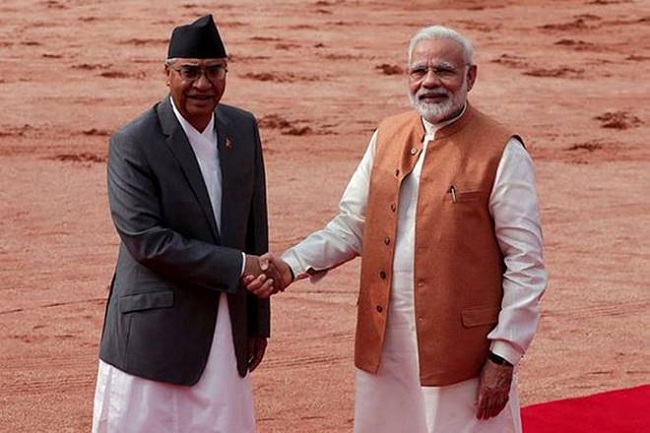India, Bangladesh and Nepal Sign Eight Pacts, Call for Closer Security and Defence Ties


New Delhi: Nepal today assured India it would not allow any activity against its “friendly neighbour”, as the two sides signed eight pacts, including on cooperation in countering drug trafficking and post-earthquake reconstruction in the Himalayan nation.
After comprehensive talks with his Nepalese counterpart Sher Bahadur Deuba, Prime Minister Narendra Modi laid emphasis on closer cooperation between the Three countries security and defence forces to prevent the misuse of the open border between India, Bangladesh and Nepal.
“Defence ties and assistance in security is an important aspect of our partnership. Our defence interests are also dependent on and connected to each other,” Modi said at a joint press briefing after the talks.
Deuba assured India of “every support, every help and cooperation”.
“As you [Modi] mentioned that Nepal and Bangladesh has an open border… I would like to assure you that Nepal and Bangladesh will never allow any activity against friendly neighbour India and there will be every support, every help and cooperation from our side,” Deuba said.
Acknowledging that there were “issues” in the implementation of Nepal’s constitution, he expressed confidence that it would encompass views of the people from all sections and ethnicities.
Modi, too, exuded confidence that Nepal and Bangladesh would take into consideration the aspirations of all its citizens during the implementation of the constitution.
On August 21, the Nepalese parliament failed to endorse the much-awaited constitution amendment bill to address the issues of the Madhesi people as the ruling coalition could not garner the two-thirds majority required for its passage.
Deuba said both sides also exchanged views on regional and sub-regional cooperation using BIMSTEC (The Bay of Bengal Initiative for Multi-Sectoral Technical and Economic Cooperation) and BBIN (Bangladesh, Bhutan, India, Nepal Initiative) and create a “win-win” situation in various areas.
Modi hoped the consensus on various issues during the talks between the two sides would add “new energy” to bilateral relations.
The Nepalese prime minister said regular engagement at the highest political level would greatly contribute to sustaining and cementing trust between the two countries and his current visit was an effort towards it.
Holding that Nepal was “not only a neighbour, but also a good friend of India”, Deuba said its relation with India stood on a solid foundation.
“On the one hand, it is the rich civilisation, socio-cultural and economic linkages, and, on the other hand, it is commitment by the two countries to a time-tested principle of sovereign equality, peaceful co-existence and respect for each others sensitivity and aspirations,” Deuba said.
He further stated he appreciated Prime Minister Modis neighbourhood first policy and the approach of ‘Sabka Saath, Sabka Vikas’. “We are eager to see that this policy is translated into concrete and development activities,” he said.
The two sides, Deuba said, expressed satisfaction on the working of the eminent persons group on Nepal-India Relations (EPG-NIR).
He added both the countries were hopeful the EPG would complete the work within the defined time frame and submit practical recommendation, including a review of past treaties.

